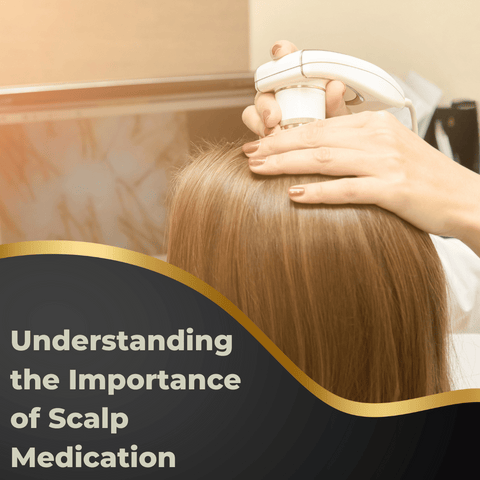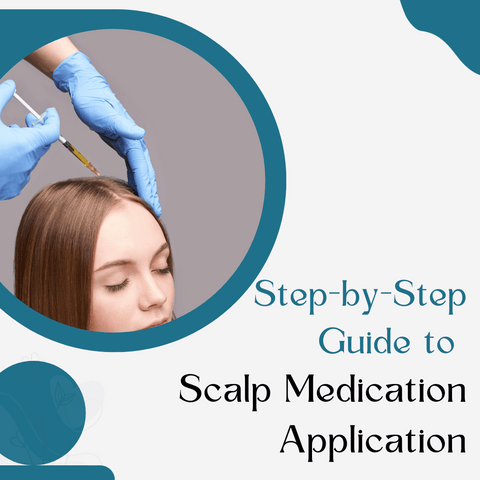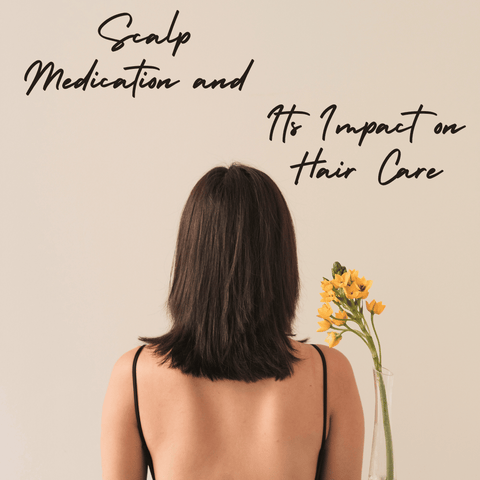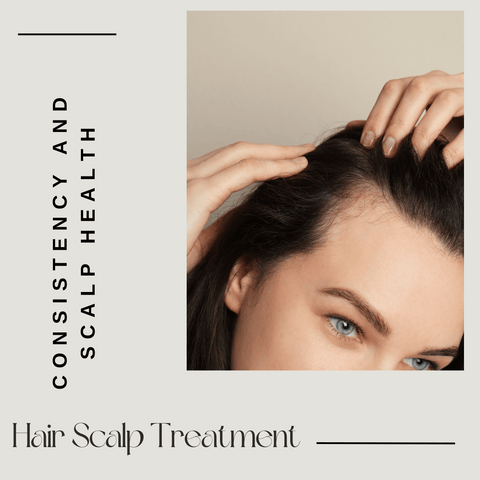Mastering the skill of applying scalp medication is critical for properly treating a variety of scalp disorders, such as dandruff, psoriasis, and hair loss. Proper application ensures that the drug reaches the affected areas and does its job. Gather your tools, prepare your scalp, segment your hair, apply the drug, be accurate, follow time guidelines, rinse or leave in, comb or brush, clean up, and keep consistency are all steps to mastering this talent. Before beginning any scalp treatment regimen, always consult with a healthcare expert or dermatologist, as they may provide personalised advice depending on your unique problem. In addition, if you have any bad reactions or your symptoms worsen, call your healthcare practitioner right away.
Understanding the Importance of Scalp Medication

Understanding the significance of scalp medicine is critical for people suffering from a variety of scalp illnesses and disorders. Scalp medicines play an important part in properly managing and treating these diseases. Treatment of scalp conditions, symptom relief, preventing complications, promoting healthy hair growth, boosting self-confidence, personalised treatment, preventing spread, long-term management, scalp health preservation, and consultation with healthcare professionals are some key points to help you understand the importance of scalp medication. The first step in finding the best scalp medication for your unique needs is to consult with a healthcare practitioner.
The Role of Scalp Medication in Managing Scalp Conditions
Scalp medication is useful in the treatment of a variety of scalp illnesses because it provides targeted treatment and symptom relief. These medications are designed to address the underlying causes of scalp issues while also boosting scalp health. A more in-depth examination of the role of scalp medicine in the treatment of scalp diseases follows:
-
Treating Underlying Causes: Scalp drugs are designed to address the underlying causes of numerous scalp ailments, such as fungal infections, inflammation, excessive oil production, and autoimmune illnesses such as psoriasis. These drugs assist in managing the illness by targeting the underlying reasons.
-
Reducing Inflammation: Inflammation of the scalp is seen in many scalp disorders, including psoriasis and seborrheic dermatitis. Topical corticosteroids and other anti-inflammatory chemicals in scalp treatments help relieve inflammation-related redness, swelling, and itching.
-
Controlling Flaking and Itching: Scalp problems such as dandruff and seborrheic dermatitis can cause flaking and itching. Active components in medications such as pyrithione zinc, salicylic acid, coal tar, or ketoconazole work to manage these symptoms, offering relief and enhancing comfort.
-
Managing Fungal Infections: Ringworm (tinea capitis) and other fungal scalp infections necessitate the use of antifungal scalp treatments to eradicate the causative organisms. These drugs aid in the prevention of infection and the promotion of recovery.
-
Promoting Hair Growth: In cases of hair loss, drugs such as minoxidil are used to stimulate hair follicles, lengthen the hair development phase, and increase hair thickness. For some people, these drugs can delay or even stop hair loss.
-
Improving Scalp Hygiene: Some scalp treatments, such as medicated shampoos, promote better scalp cleanliness by regulating oil production and avoiding scale and debris collection. This is especially useful when dealing with problems like seborrheic dermatitis.
-
Preventing Recurrence: Scalp drugs not only cure existing symptoms but also aid in the prevention of the recurrence of scalp diseases. The use of prescription drugs on a regular basis can help preserve scalp health and lessen the probability of future flare-ups.
-
Customised Treatment: Scalp drugs can be customised to a person's specific scalp condition. Dermatologists can recommend the best medication for the ailment based on its nature and severity, giving a personalised treatment strategy.
-
Relieving Discomfort: Many scalp diseases can be physically painful, causing pain, burning feelings, or an overwhelming desire to scratch. Scalp drugs relieve these symptoms, hence enhancing the patient's overall quality of life.
-
Consultation with Healthcare Professionals: Dermatologists and other healthcare experts play an important role in the treatment of scalp disorders. They are capable of precisely diagnosing the disease, prescribing the necessary drug, and advising on proper administration and maintenance.
Benefits of Precision in Scalp Medication Application
Precision in scalp medicine application has various advantages for people who have scalp diseases or are undergoing hair loss treatments. Ensuring correct and focused medication application can increase treatment effectiveness and overall scalp health. The following are the primary advantages of precision in scalp drug application:
-
Effective Treatment: When scalp medication is applied precisely to the afflicted areas, the active components are concentrated where they are most needed. This increases the medication's efficacy in treating the underlying causes of scalp problems or encouraging hair growth.
-
Reduced Waste: Precision application keeps medication from being wasted on healthy scalp areas. This is especially crucial if the medication is pricey or in restricted supply.
-
Faster Results: Medication that is applied precisely can result in faster outcomes. The active components can operate more effectively, reducing symptoms or stimulating hair growth sooner.
-
Minimised Side Effects: Some scalp drugs may have undesirable side effects or interact with healthy skin and hair. By limiting exposure to unaffected areas, precision application decreases the chance of severe side effects.
-
Improved Comfort: Itching, burning, and pain are common symptoms of scalp diseases. Individuals can find relief more quickly and comfortably by applying medication only to the affected areas.
-
Enhanced Scalp Health: Precision application aids in the preservation of the surrounding scalp and hair. Medication overuse in healthy areas can cause dryness or other problems.
-
Consistent Results: Accurate application ensures consistent results over time. By targeting specific areas, individuals can better track progress and make adjustments to their treatment plan as needed.
-
Personalization: Precision enables a more tailored approach to treatment. Based on the intensity and location of the ailment, healthcare providers might propose specific locations for pharmaceutical administration, personalising the treatment to the individual's needs.
-
Preventing Medication Interference: If certain medications come into contact with the scalp, they may interact. Such interactions can be avoided if drugs are used precisely and each prescription performs its intended purpose.
-
Cost-Efficiency: Using medication only when necessary can help people save money on prescription or over-the-counter medications by extending the life of the medication by eliminating unnecessary use.
-
Minimised Staining or Residue: Certain scalp treatments, such as those containing coal tar, have the potential to stain clothing and bedding. A careful application can assist in reducing stains by preventing the drug from coming into contact with materials needlessly.
-
Improved Patient Compliance: Individuals are more inclined to stick to their treatment plan when they notice faster and more effective outcomes with accurate administration.
Dermatologist Recommendations for Scalp Health
Dermatologists are doctors who specialise in the diagnosis and treatment of skin, hair, and scalp problems. Dermatologists can offer useful advice and recommendations for maintaining and enhancing scalp health. Regular scalp examinations, proper cleansing, a balanced diet, hydration, scalp protection, avoiding harsh styling practises, stress management, medication and treatment, avoiding overuse of styling products, regular checkups, avoiding smoking and limiting alcohol, avoiding scratching, consultation for hair loss, and following treatment plans are some common recommendations and tips from dermatologists for maintaining scalp health. Consult a dermatologist for personalised advice based on your individual condition and concerns. Following their advice can aid in the maintenance of a healthy scalp as well as the general health and appearance of your hair.
Step-by-Step Guide to Scalp Medication Application

Correctly applying scalp medication is critical for effectively treating scalp problems and promoting scalp health. Read the medication instructions, gather your supplies, wash your hands, prepare your scalp, part your hair, apply the medication, massage in gently, continue parting and applying, set a timer (if necessary), follow post-application instructions, comb or brush your hair, clean up, maintain consistency, and monitor progress. Before beginning any scalp drug programme, contact a dermatologist or healthcare practitioner. They can make personalised suggestions based on your individual condition and needs, ensuring that you utilise the best medication and apply it properly for the best outcomes.
Preparing Your Scalp for Medication
Preparing your scalp for medicine is a vital step in guaranteeing the effectiveness of therapy for a variety of scalp illnesses. Proper preparation aids in drug absorption and use. Consult a healthcare professional, understand your scalp condition, follow medication instructions, gather necessary supplies, check for allergies or sensitivities, clean your hands, shampoo and clean your hair, remove product buildup, part your hair, apply medication according to instructions, massage gently, set a timer (if necessary), and follow post-application instructions. You can improve the efficiency of your scalp medicine and your general scalp health by following these preparation measures. Remember to seek personalised advice and treatment recommendations from a healthcare professional for your specific scalp condition.
Applying Scalp Medication Correctly
It is critical to apply scalp medication correctly to ensure that it is successful in treating scalp disorders or boosting scalp health. Consult a healthcare professional, read the medication instructions, gather your supplies, prepare your scalp, part your hair, apply the medication, massage gently, continue parting and applying, set a timer (if necessary), follow post-application instructions, comb or brush your hair, clean up, maintain consistency, and monitor progress. It's vital to remember that the efficacy of scalp treatment varies based on the medication, the underlying illness, and individual circumstances. As a result, before beginning any scalp treatment regimen, always contact a dermatologist or healthcare expert to acquire the correct diagnosis and assistance customised to your unique needs.
Maximising Absorption for Effective Treatment
Maximising scalp drug absorption is critical for assuring its efficacy in treating scalp diseases or boosting scalp health. Absorption ensures that the active components reach the afflicted areas and perform as intended. Clean your scalp, pat dry your hair, part your hair, apply the medication correctly, massage gently, allow adequate contact time, avoid disturbing the medication, maintain a consistent application schedule, avoid shampooing immediately, use a scalp massager, consider scalp steaming, and monitor your progress for effective treatment. A dermatologist or healthcare practitioner is required for a thorough diagnosis and personalised suggestions, as they can assist you in selecting the most appropriate drug and application strategy for your needs.
Overcoming Challenges in Scalp Medication Application
Applying scalp medication can be difficult at times, particularly if you have a scalp ailment that makes the process painful or if the prescription itself has specific criteria. You may, however, overcome these obstacles with patience and the appropriate techniques. Itching and pain, oily hair and scalp, thick or long hair, medicine runoff, product buildup, hair loss or thinning hair, discomfort or allergies to medication, and inconsistent application are some frequent issues in scalp medication application and how to solve them. When applying scalp medicine, always follow the instructions of your healthcare provider or dermatologist, and don't be afraid to contact them if you run into problems or have concerns about your treatment plan. They can provide tailored advice and solutions depending on your unique scalp.
Scalp Medication and Its Impact on Hair Care

Scalp medicine can have a significant impact on hair care, especially in the treatment of scalp illnesses and the promotion of overall hair health. Treating scalp conditions, promoting hair growth, strengthening hair, maintaining scalp health, enhancing hair appearance, reducing hair damage, customised hair care, preventing complications, boosting confidence, long-term maintenance, and consultation with healthcare professionals are some examples of how-to scalp medicine may affect hair care. Individuals experiencing scalp difficulties or hair loss should visit a healthcare physician or dermatologist to develop a personalised treatment plan that compliments their hair care routine.
Combining Scalp Medication with Hair Care Routines
Combining scalp medicine with your hair care routine is a typical practise, especially if you have scalp issues or are experiencing hair loss. This integration enables you to efficiently address scalp concerns while maintaining your hair's health and look. Consult a dermatologist, understand your scalp condition, follow medication instructions, create a consistent routine, select compatible products, prioritise scalp health, use medication first, wait before styling, protect your scalp from the sun, monitor progress, be patient, adjust as needed, and maintain overall hair health. You may effectively manage scalp issues, boost hair growth, and preserve the overall health and appearance of your hair by incorporating scalp medication into your hair care routine. Consult a healthcare physician or dermatologist to develop a customised plan that fits your individual needs.
Ensuring Safe and Effective Scalp Treatments
Maintaining scalp health and treating scalp disorders require safe and effective scalp treatments. Following these tips, whether you're using over-the-counter or prescription meds, can help you achieve the best results while minimising any risks:
-
Consult with a Healthcare Professional: Consult a dermatologist or healthcare expert before beginning any scalp therapy. They can accurately assess your scalp issue and provide treatments that are tailored to your specific needs.
-
Follow Treatment Recommendations: Follow your healthcare provider's treatment plan and suggestions. This covers pharmaceutical application, dosage, and frequency directions. The key to efficacy is consistency.
-
Read Product Labels: If you use over-the-counter scalp products, read the labels carefully and follow the recommendations. In the ingredient list, look for any potential allergies or irritants.
-
Patch New Products: Perform a patch test on a small, inconspicuous area of skin to check for allergies or sensitivities before using any new scalp treatment or product. This is especially important for people who have sensitive skin.
-
Maintain a Clean Scalp: Use a mild, sulfate-free shampoo as directed by your healthcare provider to keep your scalp clean. A clean scalp provides a better foundation for treatment.
-
Use Medication Correctly: If you are using scalp medication, make sure to apply it precisely to the affected areas of your scalp, as directed. Maintain even distribution and avoid overuse.
-
Avoid Excessive Use: Using too much of a product or medication can have negative side effects and may not improve results. Follow the dosage and application frequency recommendations.
-
Take your time: Understand that scalp conditions and hair growth respond slowly to treatment. Expect no immediate results, and be patient in sticking to your treatment plan.
-
Reduce Heat Styling: Excessive heat from styling tools (such as hairdryers, straighteners, and curling irons) can damage the hair and scalp. If you must use heat, use a heat protector.
-
Sun protection: If your scalp is exposed to the sun, consider wearing a hat or using a scalp-specific sunscreen to avoid sunburn or damage, especially if you are taking medications that can increase sensitivity to UV rays.
-
Keep an eye out for side effects: Take note of any side effects or adverse reactions. If you experience itching, burning, redness, swelling, or any other unusual reactions, contact your healthcare provider right away.
-
Maintaining Overall Hair Health: Continue to take care of your hair's overall health by trimming it on a regular basis, avoiding excessive styling, and using appropriate hair care products.
-
Keep Hydrated and Eat Healthily: Proper hydration and a nutrient-rich diet can benefit scalp and hair health. Drink plenty of water and eat vitamin and mineral-rich foods.
-
Adjustments should be made in consultation with your provider: If you are not getting the desired results or are experiencing side effects, talk to your doctor about making changes to your treatment plan.
-
If needed, discontinue use: If a product or medication is causing severe adverse reactions, stop using it immediately and consult your doctor for an alternative treatment option.
Consistency and Scalp Health

Consistency is critical to maintaining scalp health and attaining favorable results when dealing with diverse scalp issues or concerns. Here's why consistency is important for scalp health:
-
Effective Treatment: Many scalp conditions necessitate ongoing treatment to manage symptoms or address underlying causes. Following the prescribed treatment plan, whether medications, shampoos, or lifestyle changes, is critical for achieving the desired results.
-
Recurrence Prevention: Some scalp conditions, such as dandruff or seborrheic dermatitis, can be chronic and reoccur if not treated consistently. The use of appropriate treatments on a regular basis can help prevent flare-ups and maintain scalp health.
-
Hair Growth and Maintenance: Consistency is essential when using scalp treatments to stimulate hair growth or maintain existing hair. Hair growth cycles take time, and consistently adhering to treatment recommendations can increase the likelihood of success.
-
Stable Scalp Environment: Consistent care routines aid in the creation of a stable and healthy scalp environment. This includes keeping the scalp clean, balancing oil production, and reducing inflammation.
-
Reduced Flare-Ups: Scalp conditions such as psoriasis and eczema can flare up as a result of triggers such as stress or dietary factors. Consistency in treatment and scalp care can help reduce flare-ups and their impact on scalp health.
-
Early Change Detection: Consistently monitoring your scalp and hair allows you to detect any changes or abnormalities as they occur. Early detection of problems can lead to more effective and less invasive treatments.
-
Long-Term Wellness: Scalp health is about more than just treating specific conditions; it is also about overall wellness. Consistently practising good scalp hygiene and leading a healthy lifestyle help to improve overall scalp health.
-
Establishing Healthy Habits: Keeping your scalp care routine consistent will help you develop healthy habits that will become a natural part of your daily life. This can result in better long-term scalp health.
The Importance of Consistency in Scalp Treatment
For various reasons, consistency is critical in scalp treatment. Maintaining a regular and disciplined treatment programme can contribute to greater outcomes and overall well-being, whether you're addressing a specific scalp ailment, promoting general scalp health, or managing hair-related difficulties. Here's why consistency in scalp therapy is important:
-
Effective Management of Scalp Conditions: Many scalp problems, including dandruff, psoriasis, seborrheic dermatitis, and fungal infections, necessitate constant monitoring and treatment. Consistent use of prescribed drugs, shampoos, or other therapies is critical for symptom management and relief. Disobeying the treatment plan may cause the illness to worsen or repeat.
-
Optimal Results for Hair Growth: Consistency is critical when utilising scalp treatments to stimulate hair growth or maintain the health of your existing hair. Hair growth occurs in cycles, and using treatments as directed on a regular basis increases the likelihood of getting the desired results.
-
Prevention of Relapses: If not treated consistently, scalp disorders can become chronic and prone to relapse. Regular treatment and maintenance aid in the prevention of flare-ups and the preservation of scalp health.
-
Maintenance of Scalp Environment: Your scalp care routine should be consistent to maintain a stable and healthy scalp environment. This involves keeping the scalp clean, maintaining healthy oil production, and reducing irritation. A regular regimen promotes a favourable environment for general scalp health.
-
Reduction of Irritants and Triggers: Individuals with sensitive scalps or specific triggers for scalp difficulties (such as certain hair care products or environmental factors) might avoid aggravating scalp conditions by following a consistent regimen that avoids these irritants.
-
Early Detection of Changes: Regular scalp care and observation of any changes or irregularities enable the early detection of potential problems. Early detection of issues often leads to more successful and less invasive therapy.
-
Long-Term Scalp Wellness: Scalp health is about more than simply managing acute issues; it is also about long-term well-being. Maintaining scalp health requires consistency in appropriate scalp care practises and adherence to a treatment plan.
-
Establishing Healthy Habits: Consistency aids in the formation of healthy behaviours that get engrained in your everyday routine. As a result, scalp care practises become more natural, sustainable, and effective.
Scalp Medication Application Tips for Beginners
If you're new to applying scalp medicine, it's critical to begin with a thorough grasp of your individual scalp condition and the medication you've been prescribed or want to use. Consult a healthcare professional, read medication instructions, gather your supplies, patch test, clean your hands, shampoo your hair (if necessary), part your hair, apply the medication correctly, massage gently, set a timer (if necessary), follow post-application instructions, comb or brush your hair, clean up, maintain consistency, and monitor progress. When administering scalp medication, keep in mind that consistency, patience, and following the advice of a healthcare practitioner are all vital. It may take some time to see noticeable improvements, so stick to your treatment plan for the best results.
















